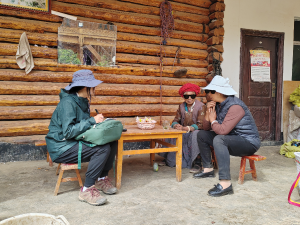Ruizhe Liu Awarded Globally Engaged Student Award from the UNM Office of the Vice President for Research
Departmental News
Posted: Jun 03, 2024 - 12:00pm

Ruizhe Liu, Evolutionary Anthropology graduate student, was awarded a Globally Engaged Graduate Student Award from the UNM Office of the Vice President for Research Office (OVPR). Her dissertation investigates the influences of market integration on kinship and social relationships in a rapidly developing part of rural China. The award recognizes her many contributions to international research, including her successes in engaging with local partners in China.
The Globally-Engaged Research Award is offered by the Global Education Office (GEO) and the Office of the Vice President for Research (OVPR) at The University of New Mexico (UNM) to highlight the dynamic international research conducted by UNM faculty and students.
Bridging both national and institutional borders, internationally focused research enhances knowledge production by simultaneously broadening the investigative lens and generating a more nuanced analysis through the incorporation of global diversity. This award showcases existing activities and serves to elevate the visibility and caliber of future research by promoting the incorporation of cross-cultural perspectives and international relevance into the UNM research enterprise. The award emphasizes our commitment to robust, intentional, international partnerships in our research and classrooms to solve a wide range of global issues and prepare a new generation of scholars to work and live in an interconnected and rapidly evolving world.
Abstract
Humans have primarily lived in small, relatively egalitarian communities with limited material wealth throughout most of their history. These societies often consisted of both kin and non-kin, yet kinship has undeniably played a significant role in shaping behaviors, norms, and institutions. As societies grow in complexity, kinship’s influence often narrows. Governmental and community structures begin to undertake roles traditionally managed within families. Similarly, religious and kinship-based norms gradually yield to those emphasizing autonomy and economic independence.
This project conducted year-long fieldwork in rural southwestern China in 2023, focusing on a matrilineal population that places great importance on kin relationships and household harmony within their religion, beliefs, social structures, and daily practices. However, this population also encounters both opportunities and challenges brought by new subsistence strategies. They are transitioning from an agricultural society to one driven by tourism and market integration, gradually embracing the broader trend of unstoppable globalization. This study examines how they respond to such transitions and how their network structures are changing.
The project aims to explore the link between changes in subsistence strategies and network transformations from a social network and biocultural perspective. The findings demonstrate the dynamics and flexibility of local networks and behaviors. Supported by the local matrilineal population, the research has sparked interest across various social science disciplines in both China and United States, including sociology, political ecology, anthropology, and archaeology. Ruizhe Liu, co-PI of the project, has been deeply involved with the local matrilineal community through extensive fieldwork, fostering the partnerships through participation in conferences and broader discussions in both English and Chinese on topics related to behavioral ecology, social network, subsistence strategies and evolutionary theory.
